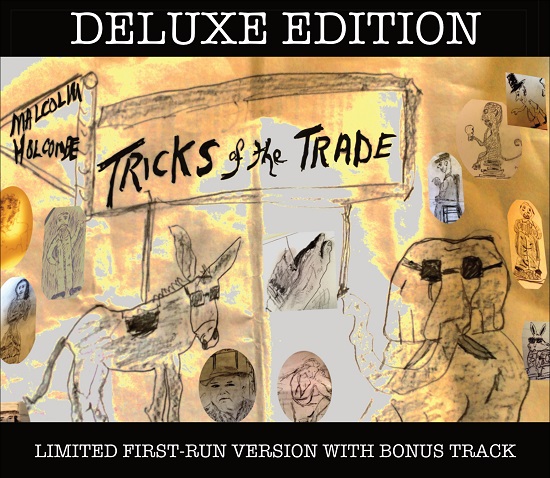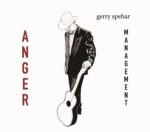
There’s a sweet spot where blues, rock and soul intersect with big guitar riffs, keys and horns. Chicago found it in the seventies, Southside Johnny has made it his lifetime’s work and Springsteen hit it perfectly with his soul covers album ‘Only the Strong Survive’. ‘Time Bomb’ is right in the centre of that sweet spot. Jan James has, as they say, paid her dues on the local Chicago scene in clubs, festivals and theatres, picking up a lot of respect along the way.
The influences she’s been exposed to shine through on ‘Time Bomb’, from the opening jazzy lilt of ‘Swingin’ in the Sweet Sunshine’ to the pure blues of the appropriately-named closing song ‘Always the Blues’. There are songs in traditional blues stylings; ‘Too Late Now’ is a slow blues given a country tinge with the piano part ‘Let Love Surround You’ is a slow blues, opening with a clipped guitar part that gives way to an over-driven guitar in the chorus. What’s noticeable on the album is that although Jan James has a powerhouse voice, it’s kept under a tight rein most of the time and doesn’t very often get into Janis Joplin territory.
‘Don’t It Feel Good’ has a midtempo soul feel while the anti-materialistic ‘Diamonds and Gold’ and the femme fatale song ‘Time Bomb’ both hint at eighties productions. The songs that jump out as being a little different are the two that address social and political issues. In Jan’s words, “All of the songs from ‘Time Bomb’ are inspired by the times we are living in.” ‘Desperate Times’ is a slow piece with some subtle keys that laments the state of the world but acknowledges that we all still need to carry on. ‘Blood on Your Hands’ has a much more direct message; it’s squarely aimed at Donald Trump for his part in the January 6th insurrection and it’s angry, very angry.
If you’re expecting an album of standard 12-bar blues tunes, ‘Time Bomb’ should be a pleasant surprise. You’ll find classic blues but you’ll also find elements of soul, country, swing, eighties FM rock and more besides. The arrangements are all classy and Jan’s vocal, which can go all the way to eleven on the raucous scale, is generally controlled throughout the album; powerful but controlled, and it’s refreshing to hear a few elements of the protest song in the mix as well. ‘Time Bomb’ is a collection of songs that work on a musical and lyrical level with some powerful and restrained musical performances. What’s not to like?
‘Time Bomb’ is released in the UK on Friday July 27th on Blue Palace Records (BPR 33318).

Malcolm Holcombe is one of those songwriters who is quiet rightly revered by music fans and fellow-songwriters alike. He’s been releasing solo material for twenty-seven years now, and the quality of his work never dips; he just goes on writing, playing, beautifully crafted songs in his own country/blues/rock style, singing them in his own distinctive cracked drawl. It’s powerful stuff, even before you get to the lyrical themes of the of the twelve songs on this album (with a bonus thirteenth on the CD version).
Malcolm has been prolific recently with six albums in the last six years despite serious health problems and that small matter of a pandemic. “Tricks of the Trade” marks a progression from his recent work. The addition of electric guitar to Jared Tyler’s string armoury adds a harder cutting edge to the arrangements while Malcolm’s lyric have more of a political edge this time around, which shouldn’t surprise anyone after the events of the last eighteen months.
Musically the stylings move across the roots spectrum from the lap steel-led old country of “Misery Loves Company” through the uptempo acoustic “Crazy Man Blues” to the country rock of “Damn Rainy Day” (with a similar theme to Paolo Nutini’s “Pencil Full of Lead”). Jared Tyler’s electric adds some punch to the album’s closer “Shaky Ground”, while a cello line adds pathos to the love ballad “Lenora Cynthia” and “Higher Ground” has a pumping bassline that evokes the Talking Heads classic, “Psycho Killer”. It’s a strikingly broad musical palette.
The lyrical edge of the album comes, typically for Malcolm Holcombe, with the allusive and indirect political references, leaving the listener to wonder what they actually heard. Just two words in “Higher Ground”, ‘slumlord whitehouse’ convey the Trump genealogy. Donald Trump’s father Fred Trump built up the property empire that the former President inherited and was attacked in song by Woody Guthrie over racial discrimination. That’s a lot of meaning packed in to two words. And while we’re talking about presidents, “On Tennessee Land” highlights the short-sightedness of voters in the Southern states, recalling Lyndon B Johnson’s comment: ‘If you can convince the lowest white man he’s better than the best colored man, he won’t notice you’re picking his pocket.’ The title song can be interpreted as a commentary on political trickery or, like the opener “Money Train”, the machinations of the music business; there are always layers within layers in Malcolm Holcombe’s songs.
“Tricks of the Trade” is the real thing. Malcolm Holcombe has taken his very personal songwriting style in a more political direction while still retaining the subtlety of lyrical expression that typifies his work. Take the time to peel way the layers and you’ll find a very satisfying album that will stay with you.
“Tricks of the Trade” is released in the UK on Friday August 20th.
Here’s the video for the opening song “The Money Train”:
 It’s quite a story; Michael McDermott’s short rise and relatively successful start to a career in the early nineties, through a long downward spiral ending in addiction and jail and, ultimately, recovery and redemption. His previous four albums “Six on the Out” (as The Westies), “Willow Springs”, “Orphans” and “Out From Under” cover those themes pretty comprehensively, although Michael McDermott isn’t showing signs of running out of inspiration any time soon. He’s a songwriter who’s equally at home writing pieces that are intensely personal, straightforward love songs, observational songs, fun songs and, on this album, a couple of powerful songs inspired by the state of America in 2020. Whatever he’s writing, he’s never less than totally honest and always completely believable.
It’s quite a story; Michael McDermott’s short rise and relatively successful start to a career in the early nineties, through a long downward spiral ending in addiction and jail and, ultimately, recovery and redemption. His previous four albums “Six on the Out” (as The Westies), “Willow Springs”, “Orphans” and “Out From Under” cover those themes pretty comprehensively, although Michael McDermott isn’t showing signs of running out of inspiration any time soon. He’s a songwriter who’s equally at home writing pieces that are intensely personal, straightforward love songs, observational songs, fun songs and, on this album, a couple of powerful songs inspired by the state of America in 2020. Whatever he’s writing, he’s never less than totally honest and always completely believable.
The furious rush of the title song opens the album, pulling no punches as it tears through the state of the USA today, melding the lyrical helter-skelter of “Subterranean Homesick Blues” with the musical punch of “Born to Run” in a scathing attack on the Trump vision (and we’re done with the Dylan and The Boss references now).
The musical stylings are what you would expect from a Michael McDermott album; there’s a lot of variety. From the headlong charge of “What in the World”, through the finger-picked guitar on “Positively Central Park” and “New York, Texas” to the Motown bounce of “Contender”. The album certainly isn’t one-paced and, as always, demonstrates Michael’s range and versatility. As ever the musicians do exactly what’s needed to get the message over, without ever sounding showy.
Lyrically, the album’s a step away from the quartet mentioned above. The title song and the heart-rending “Mother Emanuel” are both protest songs, while the rest of the album focusses mainly on a couple of themes; the post-addiction space that Michael occupies now, and an exploration of some of the events in his personal history that may have been triggers for the dark period. This isn’t about self-justification, it’s more in the nature of a warning to others of the treachery of that particular slope.
So, which songs pushed my buttons? Obviously, the title song with its stinging attack on USA 2020, including the unequivocal message: ‘It’s not to hard to see The Presidents’s a criminal’ is right up there. “The Veils of Veronica”, the story of someone with too few skins to deal with the world is heart-rending, and the gentle “Blue-Eyed Barmaid” turns the tables on the cliché of the customer pouring out his troubles to the long-suffering barmaid. With eleven new songs (plus a bonus of the acoustic demo of the title song), there’s so much to love here; the songs are intense and Michael’s vocal delivery is impassioned, as always. It’s a grim reality of the music business today that Michael McDermott is unlikely to become rich, but that won’t stop him making music and we’ll all benefit from that.
“What in the World” is released in the UK on Friday June 12th on Pauper Sky Records.
BTW, it passes the Will Kimbrough test as well; he’s on pretty much everything I’ve loved over the last five years and he’s also doing his thing here.
 OK, I’ll give you this one for free because you’ll never work it out from listening to the album. I don’t think Gerry Spehar likes Donald Trump very much. I’ve heard a few American albums this year that have railed against the state of affairs in America generally and POTUS in particular, but none that have so consistently sustained the attack across a whole album of thirteen songs or, more accurately, twelve songs and a prelude. Gerry’s solo album last year, “I Hold Gravity”, hinted at the power and breadth of “Anger Management” but the actuality is so much more brutal and brilliant.
OK, I’ll give you this one for free because you’ll never work it out from listening to the album. I don’t think Gerry Spehar likes Donald Trump very much. I’ve heard a few American albums this year that have railed against the state of affairs in America generally and POTUS in particular, but none that have so consistently sustained the attack across a whole album of thirteen songs or, more accurately, twelve songs and a prelude. Gerry’s solo album last year, “I Hold Gravity”, hinted at the power and breadth of “Anger Management” but the actuality is so much more brutal and brilliant.
The album is crammed with compassion, anger, pacifism and scathing attacks on the hypocrisy espoused by America’s current elected elite; 2018 is the year that the protest album finally resurfaced and the timing is perfect.
The album opens with the skewed logic of “Thank You Donald”, set in the immediate aftermath of Trump’s election victory, where a suicidal impulse is overturned by a desire to save family and friends from the impending Trumpquake. It’s set against a traditional string band arrangement featuring banjo and fiddle that creates a comfortable American feel the remainder of the album systematically demolishes.
The arrangements on the album cover a wide variety of musical styles from a wide variety of countries, underlining the impact that outside influences, and immigration, have had on American popular music and society. The impact is underlined in the album’s second song “Son of an Immigrant”, where the occupation of the central character (a policeman) isn’t revealed until more than halfway through the song. The central message of the song is that almost all Americans are immigrants; it just depends how far back you go.
The album seethes with anger at the ills of modern America, the bitter lyrics underpinned by some incredible musical settings. “Carnival” is a perfect example, equating Trump with Lyndon Baines Johnson against a musical setting that evokes cabaret arrangements from 1930s Germany with sour horn fills and wah-wah guitar. It’s a perfect combination, all of the elements emphasising the madness of the present-day USA; laughing at the freakshow as a distraction from the state of the nation. It’s all perfectly summed up by the advice; ‘Just keep on sayin’ the same damn thing and don’t fuck it up.’
“Bitch Heaven” is beautifully constructed, contrasting Trump with Woody Guthrie via Trump senior and his property development Beach Haven. Not only does Gerry stand the president nose-to-nose with an almost unimpeachable American musical icon, he also manages to morph the song into the Woody classic “This Land is Your Land”; it’s powerful stuff. And don’t forget the powerful, sarcastic closer “What Would Jesus Do?”, pointing the finger at the double standards and hypocrisy currently infesting Trumpton. In another penetrating insight, the title song nails the distraction technique of medicalising a perfectly natural reaction to events in today’s America.
I’d like you to do two things for me. Listen to this album on this link, and then buy a copy here. We all need to encourage people like Gerry Spehar to create masterpieces like this.
“Anger Management” is released in the UK on Friday 25 May.


